We know that professional Bike riders are still caught doping. However, now many less than in the bad old days of the Armstrong era, but how many still do it and get away with it? How far can team management be held responsible for doping amongst team members?
Cycling has become much more of a team sport than it used to be, so even if the team leader is clean, if members of his team are not, this can affect results. Leaders of teams rely on team members for support and protection. Therefore it must be the responsibility of team management to insist on “clean” riding.
For the ordinary follower of the sport it is very difficult to decide the extent of doping in professional cycling. The independent panel set up by Brian Cookson and the UCI (International Cyclists Union) quoted a member of the peloton as saying that 95% of riders doped. It was disappointing that this opinion was quoted without any evidence to back it up and the quote was anonymous so it undermines its credibility.
I was very disappointed that the UCI did not expel Astana before the Giro this year, because 5 of their team members had been found guilty of taking illegal drugs (OK not all were their top riders). This despite UCI articulating a ‘get tough’ policy. One of the guilty was a domestique, who helped Nibali to win at last year’s Tour de France. Team Manager for Astana is Alexander Vinocourov, who was found guilty of doping and suspended some years ago.
Christophe Bassons book, “A Clean Break (2014)” is about his years in the professional peloton and his resistance to doping. Bassons’ life was made hell by teammates and others in the peloton, because he refused to dope. Bassons was a very promising young cyclist, who found it impossible to keep up with his drug fuelled colleagues.
Bassons is now a regional anti doping representative in France, a position which requires him to keep abreast of developments in doping in professional cycling. Bassons writes:
“Currently questions are being asked about the extent to which products such as AICAR, GW501516, TP500 and GAS6 are being used. Some have already been found during searches of vehicles and have been used by some athletes, doctors and soigneurs. These substances provide an equivalent effect to EPO because they improve the performance of athletes by boosting the transport and utilsation of oxygen by the body.” GAS6 according to Bassons, is undetectable.
Again according to Bassons “The story is beginning again, just as it did years ago with Lance Armstrong and his US Postal Team, just as it did with the Festina team.”
Judging by the Giro and other stage races cycling is still very much team exercise, where teams support their leader if he has a chance to win the General Classification (GC). The more members of the team that are in support in the final minutes of a climbing stage the better. Therefore if doping is taking place it is likely to be by whole teams, not just by the GC contenders.
Over the past two weeks with Chris Froome’s performances in the Tour de France doping has hit the headlines again. I suppose it is inevitable that some of the media are speculating about Froome’s performance, when surely given that there is no evidence to the contrary, we should be celebrating a superb performance in the Tour from a rider who when winning in 2013 said this is “one result that would last”. At the end of his second win, Froome said “I will never dishonour the jersey”
The Sky Team grew out of Dave Brailsford’s ambition to reproduce the success of Team GB on the track, on the road, using a “marginal gains” philosophy. Mental preparation is used by having a psychologist (Steve Peters) working with the athletes, superb equipment, better nutrition and many other small improvements. For example Sky send in their own staff to vacuum hotel rooms of riders before occupation to guard against infection and take their own bed linen. It is inconceivable that Wiggins, Froome and any of the GB track and road cyclists have doped whilst riding for Sky.
Given that Sky is amazingly well funded, with a budget of £24m per year it should not come as a surprise that it does so well, but it is also down to the rise of cycling in this country that has produced such brilliant competitive cyclists. It is my view that the success and the funding has led to envy and to some of the totally unfounded comments during the Tour this year.
Brailsford’s much stated philosophy of zero tolerance for drugs led to some people leaving Sky. Michael Barry, formerly of Team Sky and US Postal, in his book “Shadows on the Road” was in no doubt that if he confessed to doping in his past with US Postal, when riding for Sky, that he would have been sacked.
Perhaps the difference now, as opposed to 10 years ago when there was evidence of drug taking and many more riders were caught, the emphasis has shifted to the Brailsford doctrine that was so successful on the track of attention to detail and “marginal gains” leading to better mental and physical fitness and improved equipment. Bradley Wiggins took to warming down after a race and at that time was looked on as being foolish – now everybody does it. Sky has the largest budget, but many other teams are well funded. Success breeds success, so if Sky’s innovations are being copied, doping is less likely.
Cycling fans want to believe that the sport is clean, but it is probably impossible for it to be totally clean, as there will always be some people who want to win so much that they will go to any lengths for a victory. However, cheating devalues the sport and makes winning irrelevant. All it does is to prove who is best at avoiding detection, not who has the best ability on a bike to ride, as in the Tour 3000+ kilometres faster than anyone else, using only physical and mental ability, training, technical expertise, team co-operation and courage.
In the past the unspoken code, the omerta, stopped doping being talked about. Cycling will only survive if the participants and their management are willing to expose and provide evidence for cheating
There is a new generation in cycling led in the UK, by world champions on the road in Wiggins, Froome, Cavendish and Nicola Cooke. In this year’s Tour nine Britons started, the most since the 1950s, so the ability of our best cyclists to compete in the biggest stage race in the world is increasing. British cyclists have doped in the past, but let us hope and it seems evident that this new generation no longer consider doping to be relevant. Armstrong’s excuse for the past is that “they were all doing it”. That cannot be applied today – times are slower and there is not one dominant cyclist amongst the top contenders. Quintana, Contador, Nibali and Froome have all won Giro, Vuelta or Tour de France in the past two years.
Despite the allegations of doping from some of the media about Chris Froome, Nairo Quintana almost caught him on the last climb in this year’s Tour, but the questions on doping were not asked of Quintana, who will one day win the Tour. He may even be superior to Froome on the climbs, but Froome’s all round bike handling skills are at present better and team support more effective.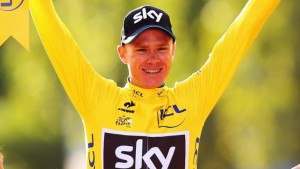
Times for the Tour de France have reduced, fewer people have been caught doping in recent years, there is more professional preparation for races and one rider does not dominate, so the conclusion surely must be that in one of the sports where testing is greatest, doping has been marginalised and fewer cynical dopers are present in the world’s greatest free sporting festivals

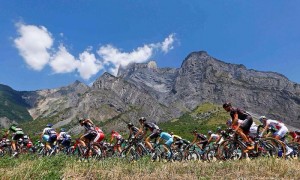
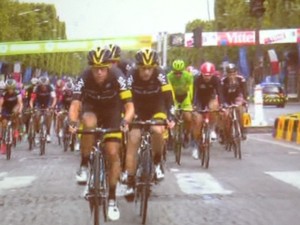
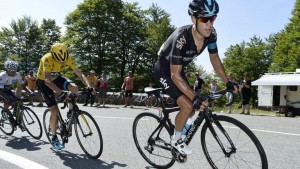
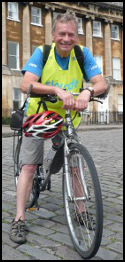 Hello, I'm Roger Symonds and I have created this blog to highlight local and wider cycling issues. Given the incredible interest and increase in cycling we must not miss this opportunity to provide the the infrastructure that gets even more people out on bikes in a safer environment.
Hello, I'm Roger Symonds and I have created this blog to highlight local and wider cycling issues. Given the incredible interest and increase in cycling we must not miss this opportunity to provide the the infrastructure that gets even more people out on bikes in a safer environment.